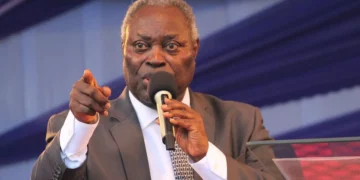33 He said: “O Adam! Tell them their names.” When he had told them, Allah said: “Did I not tell you that I know the secrets of heaven and earth, and I know what ye reveal and what ye conceal?”
‘O Adam!’ Additional honour, as if he was far away, though he was near….
We did say that when Allah said He taught Adam the names of all things, that knowledge reached Adam through inspiration, or Allah just prepared a special form of knowledge and imparted it to Adam. And Allah commanded Adam.’
“O Adam! Tell them their names.”
Look at the way the command was given, ‘O Adam!’
Just imagine the honour done to one whom Allah so addressed. “O Adam! Tell them their names.”
Even by worldly standards, how will you picture a scene where a professor, after asking a hall full of students a question that nobody could answer, and you happen to be the only one who knows the answer? The professor now gently but proudly said to you, ‘O Adam!’ If that is your name, ‘Tell them the answer.’ This is an honour indeed.
How did Allah command Adam?
Was it direct instruction, or was it through a third party?
Allah knows best!
“O Adam! Tell them their names.” And he started telling them, as a teacher would his students, the names and nature of all things. Anything that may come to your mind now, yes, Adam taught the angels. This teaching involved all languages because language is nothing but calling things their names and describing their nature.
No wonder we are told that angels lower their wings in honour of a scholar. If a man goes out searching for knowledge, the angels revere him as they revered Adam for his knowledge. All of this the angels do to one seeking knowledge. Can you imagine what they would do to someone who possesses knowledge and teaches what he knows to students?
It was narrated that Zirr bin Hubaish said: “I went to Safwan bin ‘Assal Al-Muradi, and he said: ‘What brought you here?’ I said: ‘I am seeking knowledge.’ He said: ‘I heard the Messenger of Allah say: “There is no one who goes out of his house to seek knowledge, but the angels lower their wings in approval of his action.’”
Sunan Ibn Majah 226
When he had told them, totally and completely, without missing or omitting anything or anybody, he was very thorough and meticulous in imparting what he had learnt to the angels.
Allah said: “Did I not tell you that I know the secrets of heaven and earth, and I know what ye reveal and what ye conceal?”
Of course, this is in reference to what He said earlier to the angels when they said wilt Thou place therein one who will make mischief therein and shed blood? He said I know what ye know not.
The Arabic word is Ghaib, which is the unseen secret. Only Allah knows Ghaib. Whoever claims knowledge of what is hidden is a liar. He discloses part of His Ghaib to His messengers.
26. (He is) the knower of the Unseen, and He revealeth unto none His secret,
27. Save unto every messenger whom he hath chosen, and then He maketh a guard to go before him and a guard behind him. (Al-Jin)
Abu Huraira reported God’s messenger as saying: “If anyone has intercourse with a woman who is menstruating, or uses preposterous venery with a woman, (enters her from her behind) or visits a kahin (a soothsayer), he has disbelieved in what has been sent down to Muhammad.”
“…and I know what ye reveal and what ye conceal?”
What is this that the angels reveal or conceal?
It was said that Maa Tubdun referred to when they said wilt Thou place therein one who will make mischief therein and shed blood… and Wa Maa Kuntum Taktumun was to what Satan concealed in his heart of conceit, envy, sin and transgression.
Another opinion on Maa Tubdun Wa Maa Kuntum Taktumunis refers to whatever is revealed or concealed of the actions of all created things is known to Allah. Or, it is on what the angels concealed of their desire to be Allah’s vicegerents instead of Adam.
Now, after Adam had informed the angels about the names and nature of all things, and by which his honour over them was beyond question, established, the wisdom behind his choice as Allah’s vicegerent on earth became clear. To be on Earth, you have to know the things that are on Earth. It also became plain that knowledge is a condition in leadership. The success of a leader is dependent on the extent of his knowledge of what is put under his care.
34 And behold, We said to the angels: “Bow down to Adam”, and they bowed down. Not so Iblis: he refused and was haughty: He was of those who reject Faith.
Sujud has both linguistic and technical meanings. Linguistically, it means Tazalul and Khudu’ submission or surrender.
It also connotes bowing with the intent to honour and greet by lowering the upper part of the body, like what the brothers of Yusuf did to him. We have made reference to this earlier in part 11.
The technical meaning of Sujud (prostration) is abject submission and meekness to Allah. Putting your forehead on the ground signifies total obedience, surrender, and servitude to Allah.
Now, back to the question: Was the Sujud of the angels to Adam in its linguistic or technical sense?
“Bow down to Adam”
That was the command. If that prostration was done to Adam in the technical sense of it, then it was done to Allah as no mortal has any right to bow down in that way, of putting forehead on the ground, but to Allah, the Most High. So, Adam was just the Qiblah towards which the angels directed their Sujud to Allah.
Therefore, “Bow down to Adam” means turning towards Adam as you will say I pray towards the Qiblah. So, Adam served the purpose of the Qiblah as the Ka’bah is to us, a mere direction, but we are not worshipping it; we worship Allah facing the Ka’bah. So, when the angels prostrated to Adam, they were merely adoring Allah through the direction of Adam. But suppose the meaning of Sujud in this verse is linguistic. In that case, it shows that the angels were humbled before Adam, honouring him and begging his indulgence over what happened when they said to Allah concerning His plan to create a vicegerent on earth, ‘Wilt Thou place therein one who will make mischief therein and shed blood?’ Sujud, in that sense, was that of salutation and respect.
Scholars tell us that greeting or salutation in this fashion was permitted up to the time of Yusuf. We have said earlier that the brothers of Yusuf bowed down to him as a sign of honour and respect, but they did not put their foreheads on the ground. Other scholars said salutation by lowering the upper part of the body was permitted until the time of the Prophet; sallallaahu Alayhi was a sallam who later outlawed it when some of his companions tried to honour him the way they saw people prostrate to their leaders in Persia and other lands. The Prophet, sallallaahu Alayhi, was sallam, then made greetings among Muslims by saying Assalaamu Alaykum and by a handshake. No more bowing!





